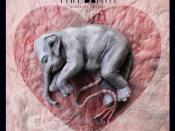Change is an ever recurrent theme in a person's life, ranging from the smallest of adjustments to complete turning points. Hence, change is also a theme which can largely be related to the audience in some way which they can identify with the author's message. As we can see in Slessor's, 'Sleep', this is no exception.
Within the poem, Slessor's attitude towards change is seen as pessimistic and with unwillingness. This is portrayed through Slessor comparing the extremity of change akin to the awakening of an unborn child's sleep and out from their mother's protective womb. Such a drastic change which Slessor writes as a 'betrayal'- is one of the first changes a human experiences in their life.
One key idea which is explored within the poem is the solace Slessor finds within being in a protective and enclosed state- the mother's womb. Stanza 1 presents the line, 'Body and no-body, flesh and no-flesh', meaning the physical and spiritual connection between the mother and the unborn child, bringing contentment, shown- 'but as a child might, with no other wish', reinforced with the affirmative line, 'yes, utterly'.
This is followed with the next stanza containing water imagery of the mother's womb. Here, Slessor uses the imagery of the sea to compare to the womb's amniotic fluids, for example, 'waves', 'engulf' and 'ferry', depict the womb protecting the baby, surrounding him/her like a body of water.
One interesting note here is the line 'bear you down my estuary, Carry you and ferry you to burial mysteriously'. This line alludes to the River Styx, also hinting the idea that the sleep which the unborn child experiences is almost like a pre-death state ('ferry you to burial') than a slumber, awoken only by the 'pangs and betrayal of harsh birth'.
The use...


